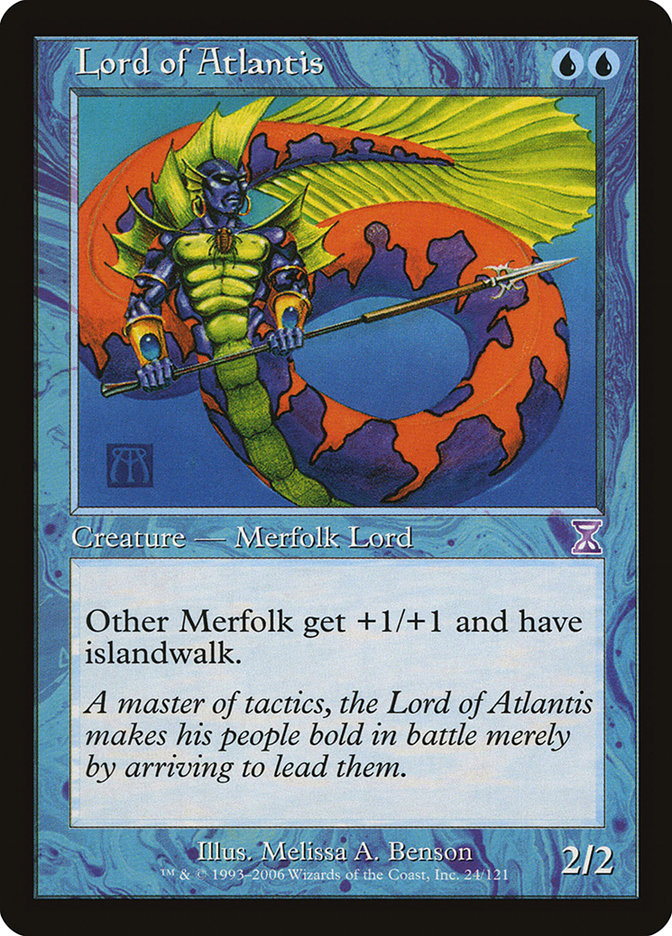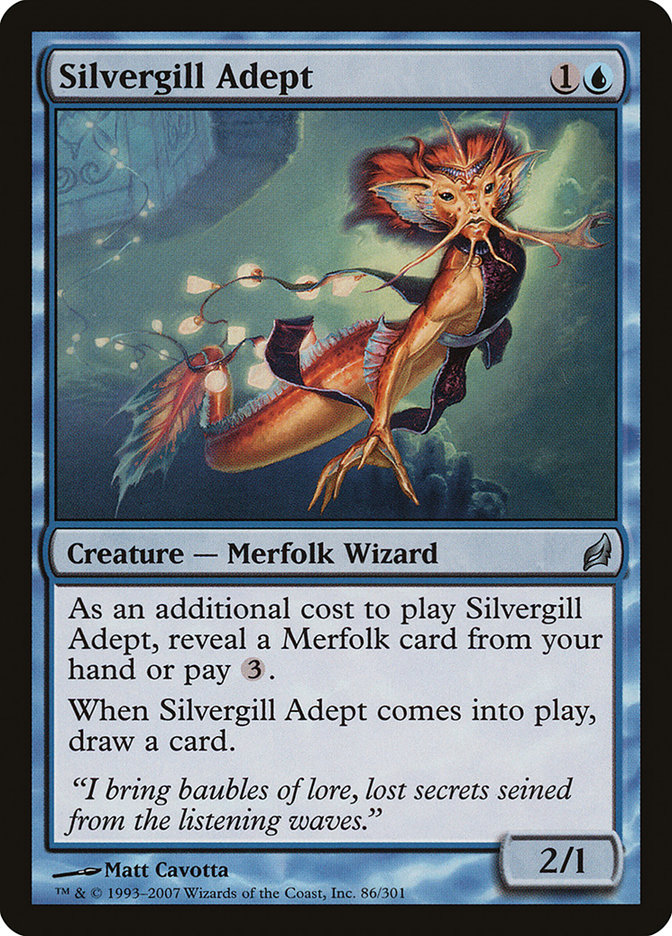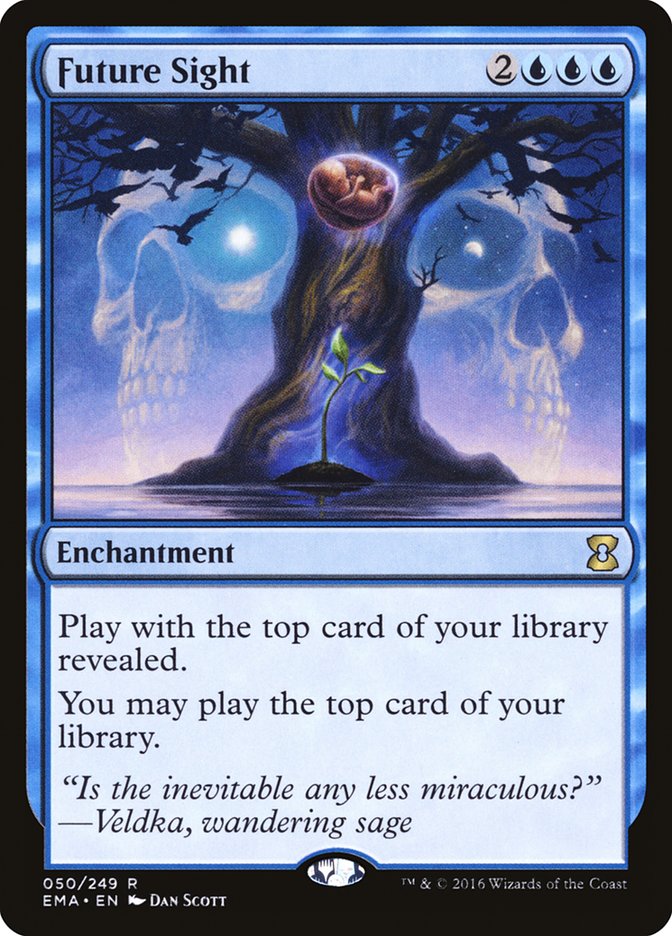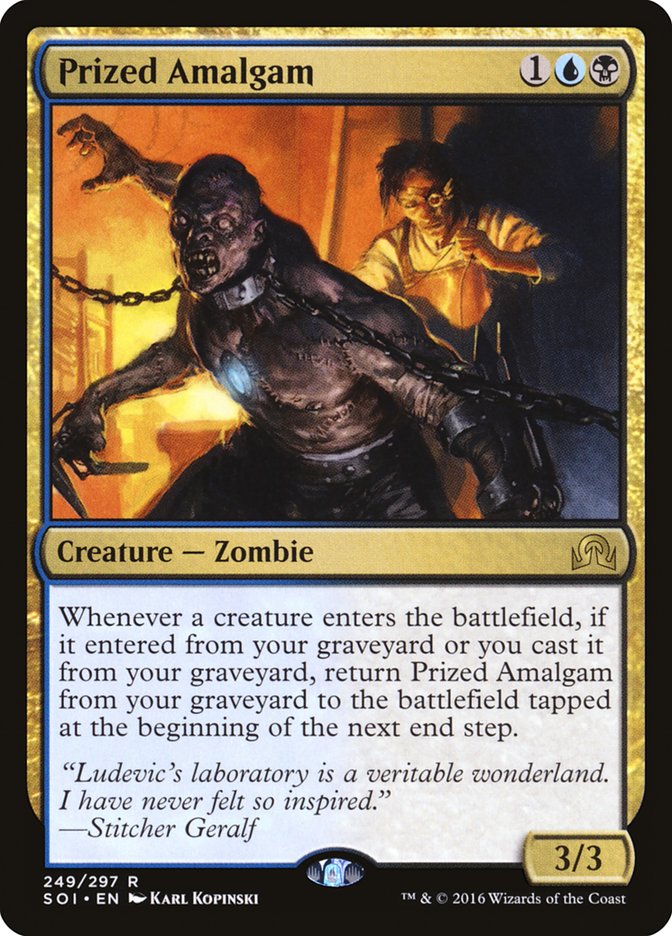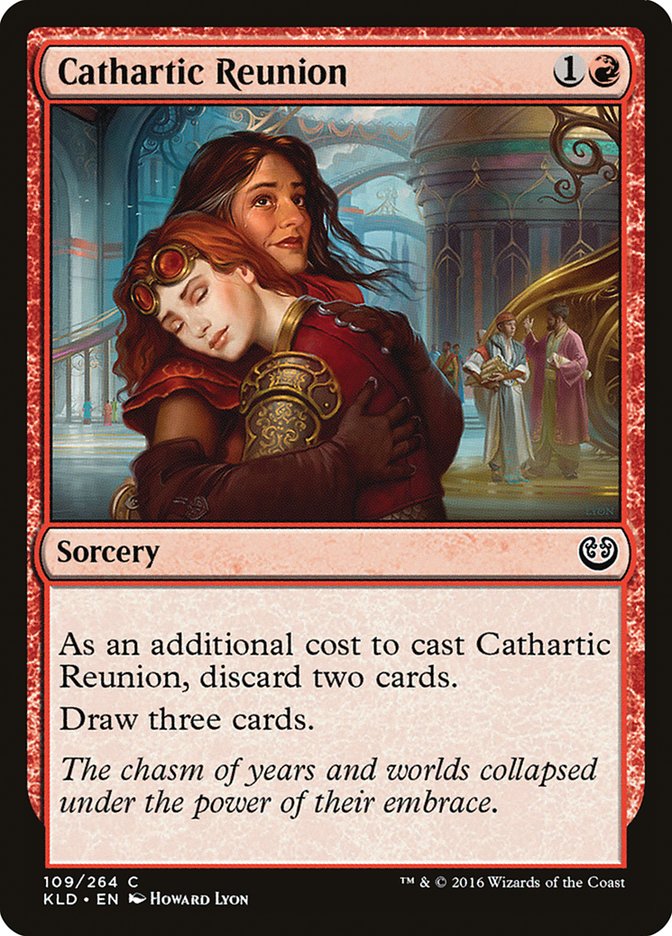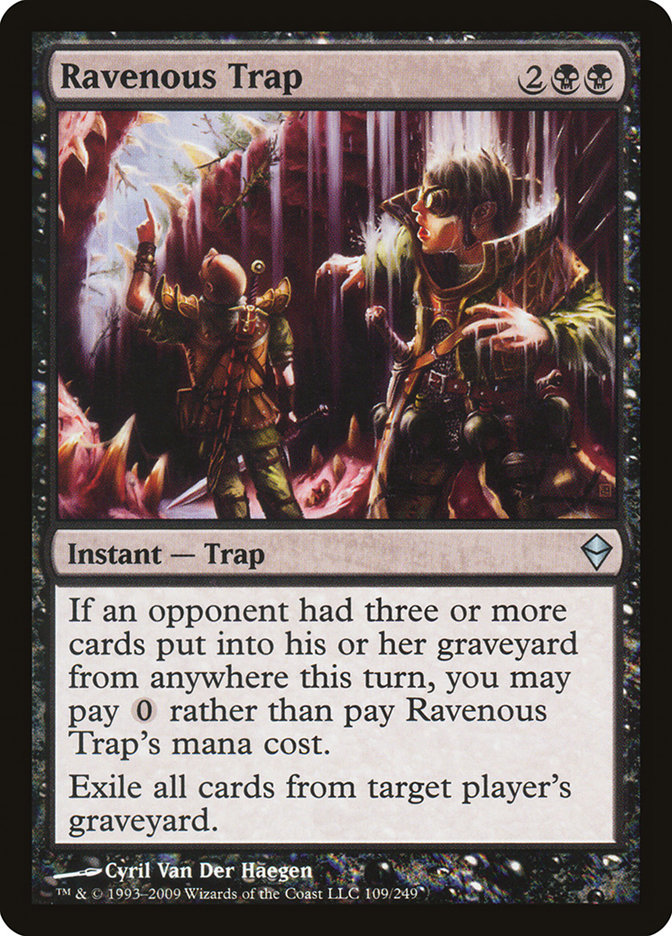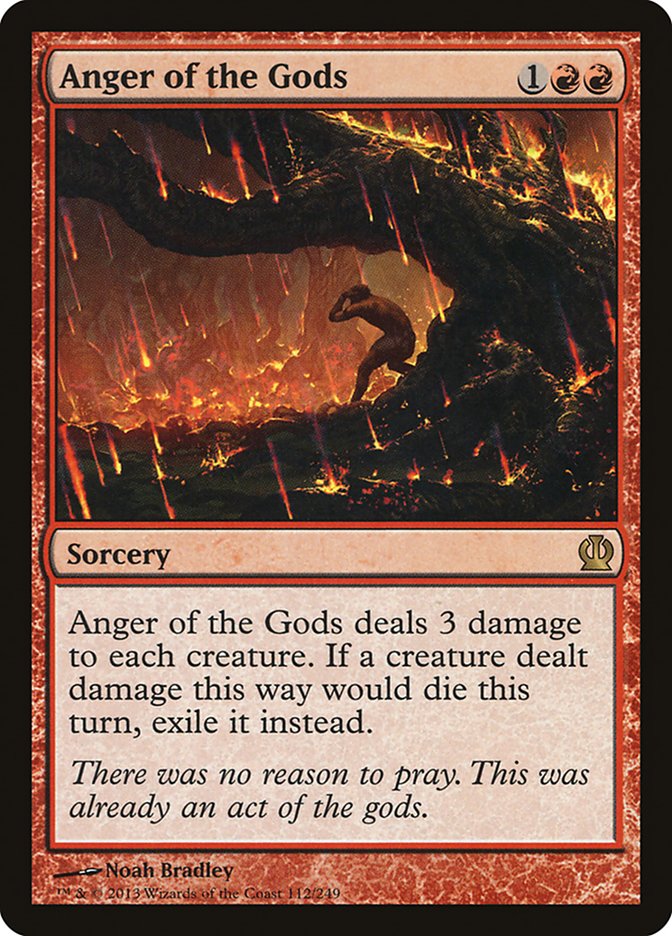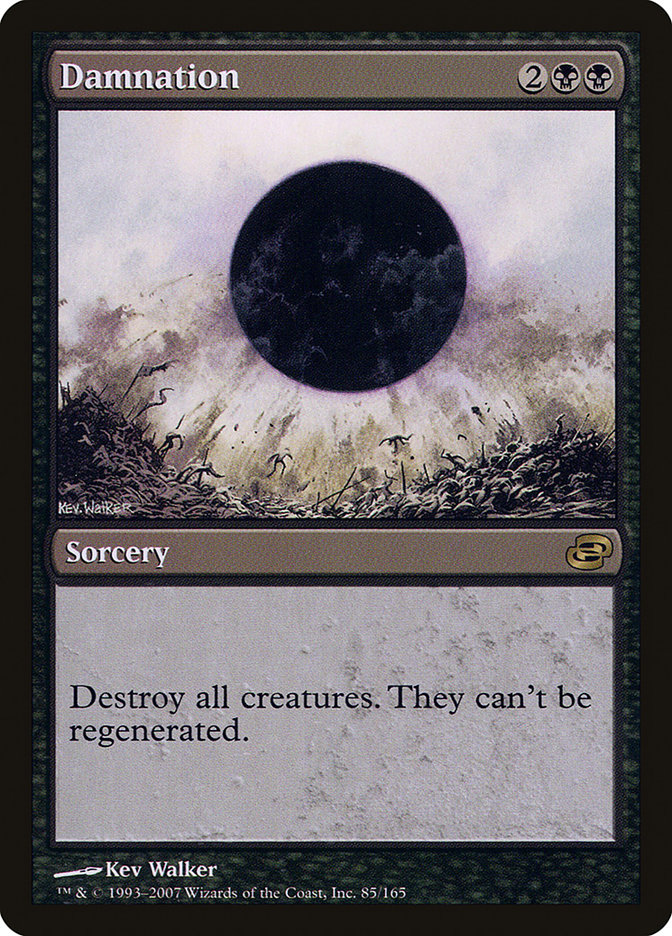As many of you who regularly watch my Twitch streams know, I’m a huge devotee of the Modern Merfolk deck. I’ve piloted Merfolk at every SCG Tour Modern event I’ve ever played in, and two of my earliest articles for StarCityGames.com were primers on the current incarnation of the deck, covering how to play it in the metagame that has existed since the banning of Splinter Twin and Eye of Ugin.
I’m also a huge believer in the archetype. It’s got just the right mix of aggression and disruption that it can succeed in the hands of a successful pilot in nearly any metagame, as long as there are enough fragile or greedy decks to disrupt and run over. Whether Merfolk is out-growing the opponent’s creatures with its “Pack Rat” strategy, gaining a mana advantage on fast decks with Aether Vial, or disrupting greedy manabases with Spreading Seas effects, I truly believe it’s a fantastically powerful deck that can reward proficient pilots.
Beat dredge in the finals. Cursecatcher MVP. Merfolk is victorious! Thanks @FacetoFaceGames pic.twitter.com/8ksWrcFfpT
— Nikachu (@nikachumtg) November 6, 2016
At Grand Prix Atlanta a few weeks ago, I played in a huge number of Modern Challenges over three days, going a collective 13-4 in matches played with Modern Merfolk. My husband came along playing the exact same 75 cards and went 13-5 in matches played. Together, we earned 1,500 prize wall tickets, enough for 150 booster packs or $375 in StarCityGames.com store credit! I couldn’t have been happier with the deck or its performance, even in a field with the two decks many people consider to be some kind of broken, Infect and Dredge.
Creatures (30)
- 4 Lord of Atlantis
- 4 Merrow Reejerey
- 4 Silvergill Adept
- 4 Cursecatcher
- 4 Master of the Pearl Trident
- 2 Tidebinder Mage
- 4 Master of Waves
- 4 Harbinger of the Tides
Lands (20)
Spells (10)
Sideboard

So can you guess what I’m taking to the Modern Open at #SCGCOL this weekend?
Dredge.
Calling an Audible
In football, if the quarterback sees something unfavorable about the defensive team’s position and they can change a play last-second, they can signal to their own team to completely change their plan and adapt to the new information. This is known as calling an audible, and the same thing can happen in the metagame surrounding Magic. You may be extremely practiced with one deck and know the metagame inside and out, ready to face each matchup from your deck’s perspective with a pocket full of tricks that only experienced pilots know how to take advantage of. But at the last second, you can hand in your deck registration sheet with a completely different 75.
Playing a new deck can help you grow and can be good for your long-term performance as a competitive Magic player. If you play Standard, you’ll have to switch decks at many rotations; and if you’re a Modern or Legacy player, certain decks may rise or fall out of favor with the release of new sets, the discovery of new strategies, or updates to the ban list. Either way, switching decks is something that nearly every Magic player will do at least once in their competitive play career. The more practice you have with a wide variety of archetypes and the more you change how you think about the game, the easier you’ll find it to make adjustments in the future.
Knowing When to Make the Switch
There are largely three reasons to make a last-minute change:
-The metagame shifts in a way that makes your deck weaker.
-You discover that another deck is more powerful.
-You just want a change of pace.
They’re all perfectly valid reasons, and nobody would blame you for using any one of these as a reason to switch decks on a whim. In fact, during Eldrazi Winter I nearly played Bant Eldrazi at Grand Prix Detroit because it was simply so much more powerful than every other deck. I didn’t even need a change of pace, and Merfolk was surprisingly strong at the time.
For Columbus, I think all three reasons contribute towards my willingness to switch from Merfolk to Dredge for this tournament. First, the sideboard space that Dredge demands in the Modern metagame means that many players may take out their artifact hate, leading to a rise in the number of Affinity decks at the top tables.
Creatures (28)
- 4 Arcbound Ravager
- 4 Ornithopter
- 2 Master of Etherium
- 3 Steel Overseer
- 3 Memnite
- 3 Etched Champion
- 4 Signal Pest
- 1 Spellskite
- 4 Vault Skirge
Lands (16)
Spells (16)

Because Merfolk’s Affinity matchup is lopsided in their favor, this means Merfolk has a chance to be a bit worse in these conditions. Next, Dredge has proven itself to be incredibly powerful, able to race with the fastest decks while surviving through the grindiest matchups. It attacks the metagame in a way that many decks are simply unprepared for, giving it an incredibly high relative power level. Finally, I’ve been playing nothing but Merfolk at paper Competitive REL events since I started playing Modern. I’ve playtested many decks online and on stream, and I’ve played plenty of R/G Tron and Jund at Friday Night Magic, but from a competitive standpoint, it’s been nothing but Merfolk for quite a long time.
Choosing Dredge
As you may know from reading Running the Gauntlet, it’s a great idea to try out other decks in your favorite formats, even if you never plan to pilot them at a competitive level. It helps you gain a better understanding of the choices they have to make so that you can exploit those key decision points when playing against them. It gives you a more well-rounded understanding of the metagame, which is incredibly valuable in a competitive setting.
As part of that process, I picked up Dredge. I’ve always loved synergistic aggro decks, from G/W Hardened Scales in recent Standard, to Merfolk in Modern. Dredge is just one more in a great line of these decks, so I began to fall in love. At first it felt odd to be so happy playing a deck everybody loves to hate, but I eventually embraced it. If a deck is legal and powerful and you find its play style to be fun, there’s nothing wrong with choosing it.
In my practice with Dredge, I noticed that it has all of the fun parts about synergistic aggro decks, but it actually loses one of the biggest weaknesses the archetype has had historically. Targeted removal usually wrecks these go-wide decks whose creatures reward one another for existing. If you use Lightning Bolt to remove Lord of Atlantis, Silvergill Adept becomes weaker and can be blocked. If you cast Murderous Cut targeting Abzan Falconer, suddenly the 8/9 Plant token from Nissa, Voice of Zendikar can be chump-blocked. But if you use Go For The Throat to kill a Prized Amalgam or block a Bloodghast with Tarmogoyf, they’ll be back next turn to attack again.
Creatures (24)
Lands (20)
Spells (16)

I will admit that too many graveyard hate cards showing up at a tournament can put a real damper on Dredge, and nearly any deck can run something to stop the strategy. This is quite different from my usual Merfolk deck, where it has matchups it wants to avoid, but not specific cards. However, a lot of decks are simply running too little graveyard hate or choosing the wrong pieces. Putting two copies of Relic of Progenitus in your Scapeshift sideboard or jamming Rest in Peace into Bant Eldrazi because it can support the mana cost isn’t enough.
A lot of players haven’t caught on that Ravenous Trap can be a nasty surprise for Dredge, leading to blowouts they don’t see coming and can’t stop with Nature’s Claim.
Players of decks running Ancient Stirrings haven’t all come to terms with the fact that a Relic of Progenitus or Tormod’s Crypt might be better than Leyline of the Void or Rest in Peace because it can be found off of their amazing cantrip. And many Jund players are still running Damnation over Anger of the Gods, even though the latter is fantastic against Dredge while still being great against a lot of other aggressive decks.
If Dredge becomes too large a part of the metagame, the appropriate shifts will happen in main decks and sideboards to keep it down, but this shift hasn’t fully happened yet. Or if that doesn’t happen and Dredge continues its meteoric rise to mirror what happened with Eldrazi last winter, a Banned & Restricted List update might end the party instead. And since I find playing the deck to be so much fun, I’d like to play Dredge at a competitive level while it is at its height, before either of those things happen.
Making the Switch
The old saying that “you should take the deck you know best, rather than the best deck” has a lot of truth to it. But if you’re going to pick up a powerful deck even if it’s not the one you’re most comfortable with, be sure to come in with as much knowledge as you can. Read articles about the archetype, playtest against as many decks as you can, and ask others about tips and tricks you can use to get a leg up.
I was lucky enough to have been given a master class in Dredge by Erin Campbell, co-host of Magic Mics and The Girlfriend Bracket. As some of you are aware, she is known partly for her love of Dredge in every format. You can catch a replay of the footage, but the big take-away is that experts on an archetype can boost your proficiency with a deck much faster than trying to figure it out on your own, so read and talk as much as you can about your new deck choice!
Once you’re familiar with the deck, I highly recommend playing with it on Magic Online as often as possible. Magic Online provides a number of niceties that can help you learn a deck, from automatically stacking your triggers for you (did you know that a Prized Amalgam will see another Prized Amalgam that enters on your own end step and enter on your opponent’s end step?) to highlighting possible dredges for every draw (including when you kill the opponent’s Thought-Knot Seer). With enough practice against the wide variety of opponents you’ll find in Magic Online leagues, you’ll be better prepared when the tournament arrives.
Finally, be sure you actually have the cards you need to make the switch. I nearly switched to Bant Eldrazi for Grand Prix Detroit during Eldrazi Winter, having made many of the same observations as I have this month for Dredge. However, I was unable to get ahold of the cards I needed in time for the event, so I ended up going with the original Merfolk plan, leading to an un-impressive finish on Day 1 that left me playing side events for Day 2. StarCityGames.com can deliver your website orders right to the tournament site for SCG Tour events, which is super convenient!
Dredge it Up!
Ever since Ross Merriam and Todd Anderson started working and winning with the deck, it’s been on the rise. I’m really excited to play Dredge at #SCGCOL. Sure, it can be scary to pick a new deck up at the last minute, but it can often be the right call. Whether you’re shooting for a new angle on the metagame, picking up a deck at a much higher power level, or you just need a break from ol’ faithful, making a last minute switch is a fine strategy if you come prepared and make good choices. Don’t worry though, these don’t have to be permanent decisions. In fact, I’m sure I’ll be back on Modern Merfolk in practically no time.
Have a wonderful week!
And as always, happy gaming!


